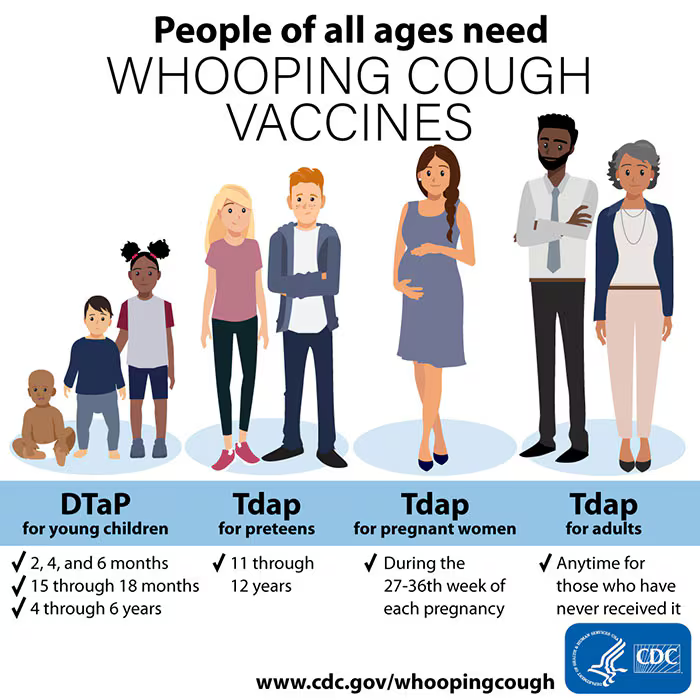Pertussis (Whooping Cough)
Pertussis, also known as whooping cough, is a highly contagious respiratory disease. It spreads from person to person, primarily through coughing and sneezing. It is known for uncontrollable, violent coughing, often making breathing hard. Pertussis is also known as “whooping cough” due to the “whooping” sound people can make when gasping for air after a coughing fit.
Pertussis can affect anyone, but infants younger than 12 months of age and individuals with weakened immune systems are at the highest risk for severe complications and death.
Symptoms
In its early stages, whooping cough appears to be nothing more than the common cold. Early symptoms can last for 1 to 2 weeks and usually include:
- Runny or stuffed-up nose
- Low-grade fever (less than 100.4°F)
- Mild, occasional cough (babies do not do this)
- Apnea (life-threatening pauses in breathing) and cyanosis (turning blue or purple) in babies and young children
One to 2 weeks after the first symptoms start, people with whooping cough may develop rapid, violent, and uncontrolled coughing fits. These coughing fits usually last 1 to 6 weeks but can last for up to 10 weeks. Coughing fits generally get worse and become more common as the illness continues.
Treatment
If you or your child develops a cold that includes a severe cough or a cough that lasts for a long time, it may be pertussis. It’s important to treat whooping cough early before coughing fits begin.
If anyone in your family/household has symptoms of pertussis, please take the following steps:
- Contact your primary care provider or visit your local urgent care facility.
- Inform them about your symptoms.
- Before returning to work, school, or childcare, the person with symptoms should be seen by a medical provider and either complete the five-day antibiotic OR have pertussis ruled out as the cause of symptoms.
- Treating pertussis early can make the illness less serious and help prevent spreading the bacteria that cause it to others.
Vaccination
Vaccination is the best way to protect against pertussis. Families are encouraged to make sure their vaccinations are up-to-date.
Protection against pertussis from the childhood vaccine, DTaP, decreases over time. Teens and adults, including pregnant women, should receive at least one “Tdap” booster, regardless of when they had their last Tetanus (Td) booster. If you have never had a Tdap booster you are eligible to receive one.
Pregnant women should get a Tdap booster during the early part of the 3rd trimester of every pregnancy. Doing so protects the baby from whooping cough during the first few months of life.
If you need the Tdap vaccine, contact your healthcare provider or call the Health Department at 828-692-4223.

